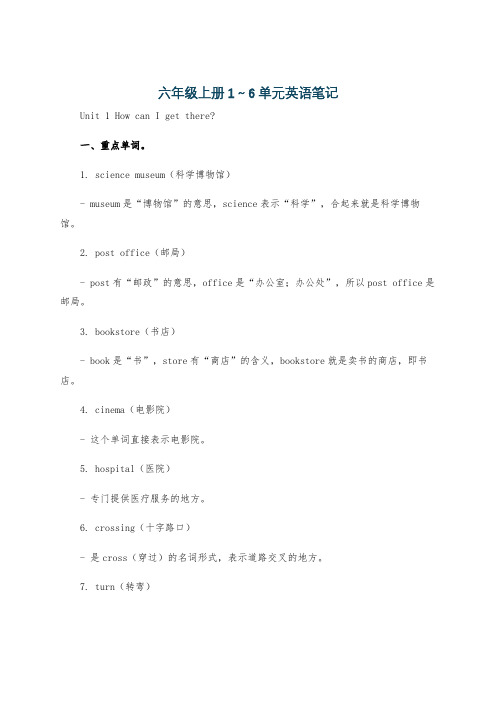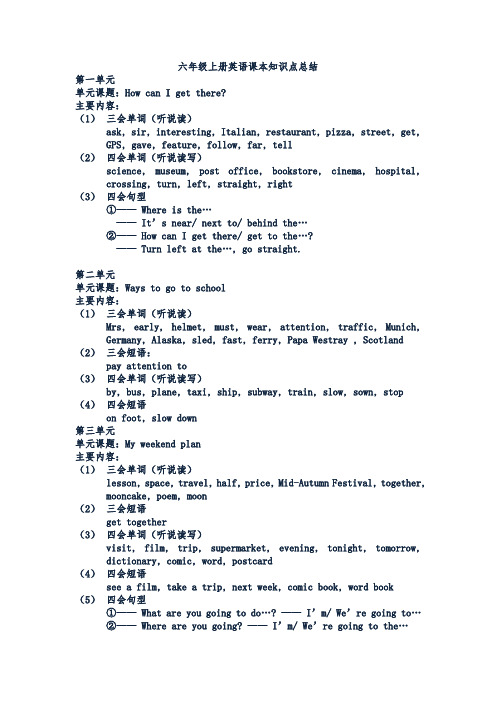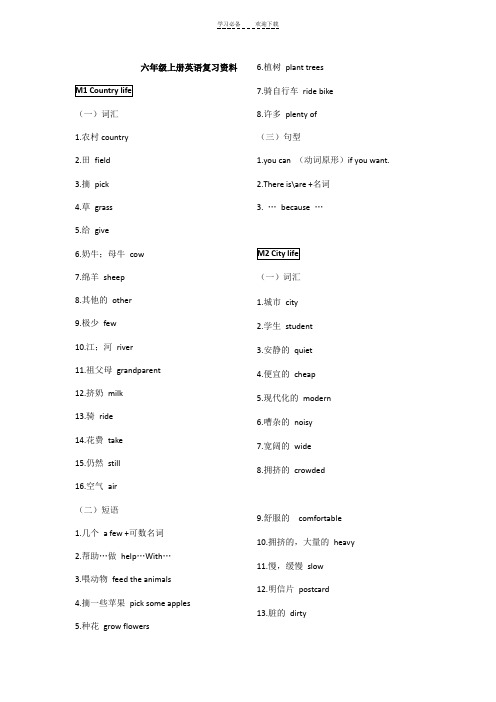教科版六年级上册英语全册模块知识点复习资料
- 格式:docx
- 大小:24.68 KB
- 文档页数:12

教科版六年级上册英语复习资料Unit 1: Hello!In this unit, students will learn basic greetings, introductions, and simple conversations.- Greetings: Hello, Good morning, Good afternoon, Good evening.- Introductions: My name is..., What's your name?, Nice to meet you.- Conversations: How are you?, I'm fine thank you, and you?, Where are you from?, I'm from...Unit 2: My FamilyIn this unit, students will learn vocabulary related to family members and expressions to describe relationships.- Vocabulary: father, mother, brother, sister, grandfather, grandmother.- Relationships: This is my father/mother/brother/sister...Unit 3: My SchoolThis unit focuses on describing school facilities, subjects, and daily routines.- School facilities: classroom, library, playground, canteen.- Subjects: English, Math, Science, Chinese, Art, Music.- Daily routines: I go to school at..., I have English/Math/Science class.Unit 4: My HomeIn this unit, students will learn vocabulary related to different rooms and objects in the house.- Rooms: living room, bedroom, kitchen, bathroom.- Objects: sofa, bed, table, chair, TV, refrigerator.Unit 5: My DayThis unit introduces vocabulary and expressions related to daily activities and time.- Activities: get up, have breakfast/lunch/dinner, go to school, do homework, play sports.- Time: morning, afternoon, evening.Unit 6: My HobbiesIn this unit, students will learn vocabulary related to different hobbies and leisure activities.- Hobbies: drawing, swimming, singing, dancing, reading, playing basketball/football.Unit 7: My CityThis unit focuses on introducing different places and transportation in a city.- Places: park, museum, zoo, supermarket.- Transportation: bus, subway, bike, car.Unit 8: My ClothesIn this unit, students will learn vocabulary related to different clothing items and colors.- Clothing: shirt, pants, dress, skirt, shoes, hat.- Colors: red, blue, yellow, green, black, white.Unit 9: My FoodThis unit introduces vocabulary related to different foods and drinks.- Foods: rice, noodles, bread, vegetables, fruits.- Drinks: water, milk, juice, tea.以上是教科版六年级上册英语复习资料的主要内容。

教科版六年级上册英语知识点总结|词组、句型、语法、书面表达Module 1 Country lifeUnit 1 What are those farmers doing?一、词组feed the chickens and ducks feed the pigs feed the horsegrow flowers and vegetables plant trees cut grassany other on the farm a few…二、句型:1.What are those farmers doing?They’re cutting grass to feed the animals.2.What do you grow on your farm?3.We have a few goats and pigs.4.There are fruit trees in this field.5.There is a cow on the farm.三、语法名词单复数:1、一般情况下,直接加-s。
如:book-books, bag-bags, cat-cats, bed-beds2、以s. x. sh. ch结尾,加-es。
如:bus-buses, box-boxes, watch-watches3、以“辅音字母+y”结尾,变y为i, 再加-es。
如:family-families(家庭), strawberry-strawberries(草莓)4、以“f或fe”结尾,变f或fe为v, 再加-es。
5、不规则名词复数:man-men woman-women policeman(男警察)-policemenpolicewoman(女警察)-policewomen child(孩子)-childrenfoot-feet tooth-teeth单复同行:fish-fish sheep(羊)-sheep people-peopleChinese-Chinese Japanese-Japanese不可数名词:water(水) milk(牛奶) tea(茶) rice(米饭) orange(橙汁)juice(果汁)bread (面包)等Unit 2 A country life is a healthy life一、词组wake up more than plenty of ride a bikeget home at that time thanks for lots of…二、句型1. A country life is a healthy life.2. It takes about 40 minutes.3. I am always very busy but I never feel tired, because I have plenty of exercise.4. When I get home after school, there is still much work to do.Module 2 City lifeUnit 3 Where are you from?一、重点单词Tall new wide crowded big modern large cleancomfortable heavy slow quiet cheap noisy expensive…短语:be from visit a museum go to the cinemaeach other play with…二、句型:1. Where are you from? I am from New York City in America.2. It’s a big and modern city but it’s quite noisy.。

Module 1 Country life本模块重点学习谈论农村生活的句型。
现将本模块主要句型及相关知识归纳如下: 词汇分类名词:country.农村field田grass草cow奶牛;母牛goose 鹅river河;江air空气sheep绵羊goat山羊grandparent祖父(母);外祖父(母)动词:pick摘give给milk挤奶ride骑take花费其他: still仍然few极少;几乎没有other其他的;别的;其他的(人或事) 习惯搭配/短语pick some apples摘一些苹果grow rice种植水稻cut grass割草feed the animals喂动物wake up醒来ride my bike骑自行车every day每天after school放学后a few几个、条on your farm在你的农场里in this field.在这片田里on the farm在农场里on the river在河面上plenty of充足的,足量的help…with.在……(方面)帮助惯用表达式So many things..很多东西。
Oh yes.喊,是的。
They look lovely.它们看起来很可爱公式化句型询问对方在农场里种植什么的句型What do you grow on your/the farm?表达“如果你想要的话,你可以做某事”的句型You can pick some apples or oranges from the trees if you want.You can have a picnic in the park if you want.表达我们用有某物的数量的句型We have more than fifty cows/ten eggs.Module 2 City life本模块重点学习询问对方来自哪里的句里以及谈论与城市生活相关的话。
现将本模块主要句型及相关知识归纳如下词汇分类名词:city城市student学生postcard 明信片countryside农村theatre剧院形容词:quiet安静的cheap便宜的modern现代化的noisy杂的wide宽阔的heavy拥挤的:大量的dirty脏的afraid害怕slow慢的;缓慢的crowded拥挤的comfortable舒服的其他: sell出售(过去式是sold) because因为习惯搭配/短语be born出生go to the cinema去电影院email each other互相发电子邮件clap your hands拍拍你的手tap your knees拍拍你的膝盖stamp your feet跺跺你的脚get back home回家live in居住play with.和……一起玩耍in New York在纽约on the farm在农场in the city在城市里on time准时different to…不同于be afraid..害怕…at night在夜晚all day整天too many太多crowded streets 拥挤的街道modern buildings现代化的建筑物公式化句型询问对方来自哪里的句型及其答语What are you from?I’m/we’re from London/Beijing/New York.询问对方是否喜欢住在某地的句型及其答语Do you like living in our city/the countryside/there? Yes, I/we do. No, I/we don’t.询问某地什么样的句型及其答语What’s New York/Hangzhou like?It’s big and modern/very beauti ful.表达“它非常不同于……”的句型It is very different to our home in the country.It is very different to the car over there.表达某人害怕做某事的句型I/they/he am/are/is afraid to stay at home alone/go outside at night/climb the tall tree.表达某人迫不及待做某事的句型I/we/he can’t wait to see my good friend/join the club/play football.Module 3 Health本模块重点学习如何询问某人怎么了。

六年级上册1~6单元英语笔记Unit 1 How can I get there?一、重点单词。
1. science museum(科学博物馆)- museum是“博物馆”的意思,science表示“科学”,合起来就是科学博物馆。
2. post office(邮局)- post有“邮政”的意思,office是“办公室;办公处”,所以post office是邮局。
3. bookstore(书店)- book是“书”,store有“商店”的含义,bookstore就是卖书的商店,即书店。
4. cinema(电影院)- 这个单词直接表示电影院。
5. hospital(医院)- 专门提供医疗服务的地方。
6. crossing(十字路口)- 是cross(穿过)的名词形式,表示道路交叉的地方。
7. turn(转弯)- 既可以作动词,如turn left(向左转),turn right(向右转);也可以作名词。
二、重点短语。
1. near(在……附近)- 例如:The post office is near the bookstore.(邮局在书店附近。
)2. next to(紧挨着;与……相邻)- My home is next to the cinema.(我的家紧挨着电影院。
)3. in front of(在……前面)- There is a tree in front of my house.(我家前面有一棵树。
注意:in front of是在物体外部的前面,而in the front of是在物体内部的前面,如There is a blackboard in the front of the classroom.教室里前面有一块黑板。
)4. behind(在……后面)- The cat is behind the box.(猫在盒子后面。
)5. go straight(直走)- Go straight and you can see the hospital.(直走你就能看到医院。

六年级上册英语课本知识点总结第一单元单元课题:How can I get there?主要内容:(1)三会单词(听说读)ask, sir, interesting, Italian, restaurant, pizza, street, get,GPS, gave, feature, follow, far, tell(2)四会单词(听说读写)science, museum, post office, bookstore, cinema, hospital,crossing, turn, left, straight, right(3)四会句型①—— Where is the…—— It’s near/ next to/ behind the…②—— How can I get there/ get to the…?—— Turn left at the…, go straight.第二单元单元课题:Ways to go to school主要内容:(1)三会单词(听说读)Mrs, early, helmet, must, wear, attention, traffic, Munich,Germany, Alaska, sled, fast, ferry, Papa Westray , Scotland (2)三会短语:pay attention to(3)四会单词(听说读写)by, bus, plane, taxi, ship, subway, train, slow, sown, stop (4)四会短语on foot, slow down第三单元单元课题:My weekend plan主要内容:(1)三会单词(听说读)lesson, space, travel, half, price, Mid-Autumn Festival, together, mooncake, poem, moon(2)三会短语get together(3)四会单词(听说读写)visit, film, trip, supermarket, evening, tonight, tomorrow,dictionary, comic, word, postcard(4)四会短语see a film, take a trip, next week, comic book, word book(5)四会句型①—— What are you going to do…? —— I’m/ We’re going to…②—— Where are you going? —— I’m/ We’re going to the…③— When are you going? ——(时间)第四单元单元课题:I have a pen pal主要内容:(1)三会单词(听说读)pen pal, hobby, jasmine, idea, Canberra, amazing, shall, goal, join, club, share(2)四会单词(听说读写)studies, puzzle, hiking(3)四会句型①—— What is ×××’s hobby? —— He/ She likes doing sth.②—— What are ×××’s hobbies?—— He/ She like doing, doing and doing sth.③—— Does he/ she…—— Yes, he/ she does. No, he/ she doesn’t.(4)重点语法点①动词的-ing形式,即like doing sth.表达喜欢做某事。

2023年新教科版英语六年级上册知识点整理Unit 1 - Greetings and Introductions- Basic greetings: Hello, Hi, Good morning, Good afternoon, Good evening- Introducing yourself: My name is..., I am...- Talking about age: How old are you? I am... years old.- Expressing feelings: I feel..., I am...- Simple questions and answers: What's your name? How are you?Unit 2 - Family- Vocabulary related to family members: father, mother, brother, sister, grandfather, grandmother, etc.- Talking about family relationships: He is my father. She is my sister.- Describing family members: My father is tall. My sister has short hair.- Simple questions and answers about family: Do you have any brothers or sisters? How many people are there in your family?Unit 3 - Numbers- Counting numbers 1-100- Basic math operations: addition and subtraction- Telling time: What time is it? It's...- Talking about age- Simple questions and answers about numbers: How many...? How old...?Unit 4 - Colors and Shapes- Basic colors: red, blue, green, yellow, etc.- Vocabulary related to shapes: circle, square, triangle, etc.- Describing colors and shapes: The sky is blue. The shape is a circle.- Simple questions and answers about colors and shapes: What color is...? What shape is...?Unit 5 - School Life- Vocabulary related to school: classroom, teacher, student, desk, etc.- Talking about school activities: I study English. We have math class.- Expressing likes and dislikes: I like... I don't like...- Simple questions and answers about school life: What subjects do you have? Do you like school?Unit 6 - Daily Routines- Vocabulary related to daily routines: wake up, brush teeth, eat breakfast, go to school, etc.- Talking about daily activities: I wake up at 7 o'clock. I brush my teeth before breakfast.- Sequencing daily routines: First, next, then, finally- Simple questions and answers about daily routines: What time do you wake up? What do you do after school?Unit 7 - Food and Drinks- Vocabulary related to food and drinks: apple, banana, bread, milk, etc.- Talking about food preferences: I like hamburgers. I don't like vegetables.- Describing food: The apple is red. The bread is soft.- Simple questions and answers about food: What's your favorite food? Do you like...?Unit 8 - Animals- Vocabulary related to animals: dog, cat, bird, rabbit, etc.- Describing animals: The cat is small. The dog has long ears.- Talking about animal characteristics: Dogs can run fast. Cats can climb trees.- Simple questions and answers about animals: Do you have any pets? What's your favorite animal?Unit 9 - Weather- Vocabulary related to weather: sunny, cloudy, rainy, windy, etc.- Describing weather conditions: It's sunny today. It's raining heavily.- Talking about clothing according to weather: I wear shorts in summer. I wear a jacket in winter.- Simple questions and answers about weather: What's the weather like today? What do you wear in...?Unit 10 - Hobbies and Sports- Vocabulary related to hobbies and sports: swimming, playing soccer, dancing, painting, etc.- Expressing hobbies and interests: I like playing the piano. My hobby is reading.- Talking about sports activities: I play soccer on weekends. We have PE class on Thursdays.- Simple questions and answers about hobbies and sports: What's your favorite hobby? Do you play any sports?以上是2023年新教科版英语六年级上册的知识点整理。
可编辑修改精选全文完整版教科版六年级上册基础知识汇总Unit 1 What are those farmers doing? 【重点单词】1.country农村2.field田3.pick摘4.grass草5.cow奶牛;母牛6.sheep绵羊(单复数一样)7.goat山羊8.goose鹅(复数是geese)9.river河;江10.other其他的;别的/其他的(人或事)11.few极少;几乎没有【重点短语】1.feed the chickens and ducks喂鸡和鸭子2.feed the pigs喂猪3.feed the horse喂马4.grow flowers and vegetables种花和蔬菜5.plant trees植树6.on your farm在你的农场里7.in this field在这片田里8.pick some apples摘一些苹果9.grow rice种植水稻10.cut grass割草11.feed the animals喂动物12.other animals其他动物13.a few几(个、条…)14.on the river在河面上【知识总结】1.What do you grow on your farm,Uncle Chen?句子结构:What do you grow on your/the farm?此句型用于询问对方在农场里种植什么。
例如:—What do you grow on your farm?你在你的农场里种植什么?—Some vegetables.一些蔬菜。
2.You can pick some apples or oranges from the trees if you want.句子结构:You can十动词(短语)原形十if you want..此句型用于表达“如果你想要的话,你可以…”。
if是连词,在这里用于引导条件状语从句,意为“如果”。
六年级英语上册1到4单元的知识重点一、介绍六年级英语上册的1到4单元是初中英语学习的重要阶段,通过对这些单元的学习,学生可以掌握英语语言的基础知识,并建立起对英语学习的兴趣。
本文将从语法、词汇、阅读和听力等方面逐一介绍这些单元的重点知识,以帮助学生更好地学习和掌握这些知识。
二、语法重点在这几个单元中,学生将学习到一些基础的语法知识,如动词的时态、形容词和副词的用法等。
在动词的时态方面,学生需要掌握一般现在时、一般过去时和一般将来时的用法,以及一些特殊动词的变化规则。
在形容词和副词的用法方面,学生需要学会用适当的形容词和副词来修饰名词和动词,从而丰富句子的表达方式。
三、词汇重点1. 单词拼写和词汇量的扩展是六年级英语学习的重要内容。
在这几个单元中,学生将学习到一些日常生活中常用的单词和短语,如数字、时间、颜色、家庭成员等。
学生需要通过多次的听写和朗读来掌握这些单词和短语的拼写和读音。
2. 另外,学生还需要学习一些常见的动词短语和固定搭配,如go to school, have breakfast等,这些词汇的掌握对于学生的语言表达能力和阅读理解能力都具有重要意义。
四、阅读重点在这几个单元的阅读教学中,学生将接触到一些简单的英语文章和故事,如介绍动物、描述家庭生活等。
学生需要通过阅读来提高自己的阅读理解能力,并学会从文章中获取信息,了解文章的主题和大意。
五、听力重点1. 听力是语言学习中不可或缺的一部分,通过听力训练,学生可以提高自己的听力水平,锻炼自己对语言的理解能力。
在这几个单元中,学生将接触到一些简单的听力材料,如日常生活中的对话和短文等,学生需要通过听力练习来提高自己的听力技能。
2. 学生还需要学会听懂一些日常用语和常见口语表达,如问候语、感谢语、道歉语等,这些都是日常交流中不可或缺的内容。
六、总结与展望通过对六年级英语上册1到4单元的知识重点的介绍,我们可以看到,在这几个单元中,学生将学习到一些基础的语法知识、词汇和阅读、听力等方面的内容。
教科版六年级上册英语全册模块知识点复习资料Module 1 Country life本模块重点学习谈论农村生活的句型。
现将本模块主要句型及相关知识归纳如下: 词汇分类名词:country.农村field田grass草cow奶牛;母牛goose 鹅river河;江air空气sheep绵羊goat山羊grandparent祖父(母);外祖父(母)动词:pick摘give给milk挤奶ride骑take花费其他: still仍然few极少;几乎没有other其他的;别的;其他的(人或事) 习惯搭配/短语pick some apples摘一些苹果grow rice种植水稻cut grass割草feed the animals喂动物wake up醒来ride my bike骑自行车every day每天after school放学后a few几个、条on your farm在你的农场里in this field.在这片田里on the farm在农场里on the river在河面上plenty of充足的,足量的help…with.在……(方面)帮助惯用表达式So many things..很多东西。
Oh yes.喊,是的。
They look lovely.它们看起来很可爱公式化句型询问对方在农场里种植什么的句型What do you grow on your/the farm?表达“如果你想要的话,你可以做某事”的句型You can pick some apples or oranges from the trees if you want.You can have a picnic in the park if you want.表达我们用有某物的数量的句型We have more than fifty cows/ten eggs.Module 2 City life本模块重点学习询问对方来自哪里的句里以及谈论与城市生活相关的话。
现将本模块主要句型及相关知识归纳如下词汇分类名词:city城市student学生postcard 明信片countryside农村theatre剧院形容词:quiet安静的cheap便宜的modern现代化的noisy杂的wide宽阔的heavy拥挤的:大量的dirty脏的afraid害怕slow慢的;缓慢的crowded拥挤的comfortable舒服的其他: sell出售(过去式是sold) because因为习惯搭配/短语be born出生go to the cinema去电影院email each other互相发电子邮件clap your hands拍拍你的手tap your knees拍拍你的膝盖stamp your feet跺跺你的脚get back home回家live in居住play with.和……一起玩耍in New York在纽约on the farm在农场in the city在城市里on time准时different to…不同于be afraid..害怕…at night在夜晚all day整天too many太多crowded streets 拥挤的街道modern buildings现代化的建筑物公式化句型询问对方来自哪里的句型及其答语What are you from?I’m/we’re from London/Beijing/New York.询问对方是否喜欢住在某地的句型及其答语Do you like living in our city/the countryside/there? Yes, I/we do. No, I/we don’t.询问某地什么样的句型及其答语What’s New York/Hangzhou like?It’s big and modern/very beauti ful.表达“它非常不同于……”的句型It is very different to our home in the country.It is very different to the car over there.表达某人害怕做某事的句型I/they/he am/are/is afraid to stay at home alone/go outside at night/climb the tall tree.表达某人迫不及待做某事的句型I/we/he can’t wait to see my good friend/join the club/pla y football.Module 3 Health本模块重点学习如何询问某人怎么了。
现将本模块主要句型及相关知识归纳如下: 词汇分类名词:health健康matter事情stomachache 疼check-up检查medicine药toothache牙疼headache头疼finger手指rest休息fever发烧secret秘密time次smile 微笑;笑容动词:ate吃(eat的过去式)hear听到(过去式是heard) gave给(give的过去式) brush刷wore穿(wear的过去式)take服(药)(过去式是tookcould能够(can的过去式)diet节食限食形容词:ill病的simple 简单的oily多油的;油腻的less较少的broken断了的副词:even甚至twice两次finally最后地least最少(小) 习惯搭配/短语have a stomachache胃疼see a doctor看医生go to the hospital去医院be careful小心have a toothache牙疼brush teeth刷牙have a broken finger手指破了take exercise锻炼take a rest休息have a cold感冒take some medicine吃些药have a headache头疼have a fever发烧three times a day一天三次twice a day一天两次simple things简单的事情plenty of sleep充足的睡眠go to bed 上床睡觉wake up醒来oily food油的食物go to school去上学too much太多on weekdays在工作日at least至少each night每天晚上in the park在公园里stay healthy保持健康drink milk喝牛奶keep a good diet保持一个良好的饮食习惯惯用表达式You don' t look well.你看起来不太好。
I' m sorry to hear that.听到这个我感到很难过What’s the matter?怎么回事?公式化句型询问某人/某物的情况的句型What’s the matter with you/with your bike?表达自己生了什么病的句型I have a headache/toothache.表达自己听到不好的消息是很难过的句型I’m sorry to hear that.询问某人说了什么的句型What did you/he/they say?住对方早日康复的句型You will be well soon.Module 4 Past experiences本模块重点学习如何询问并回答过去发生了什么事情。
现将本模块主要句型及相关知识归纳如下:词汇分类名词: experience经验;经历yesterday昨天year年diary日记Disneyland迪士尼公园动词:bought买(buy的过去式) came来(come的过去式)met遇见;聚集(meet的过去式) saw看见;明白(see的过去式)read读(read的过去式)felt感党,觉得(feel的过去式)sat坐(sit的过去式)形容词:past过去的angry生气的:愤怒的poor可怜的last近的,上一个的better更好surprised惊讶的其他: later后来until直到习惯搭配/短语go shopping去购物play basketball打篮球stay at home待在家里clean my room打扫我的房间ride my bike 骑我的自行车see a film看一场电影read a storybook读一本故事书go on a trip去旅行by train乘火车take a photo照相feel better感觉好些了have lunch吃午餐talk about谈论Children's Day儿童节a pair of一双,一副at the park在公园里no/not...at all一点都不…on the street在街道上mickey Mouse米老鼠Donald Duck唐老鸭a little一点eat at a restaurant在一个餐馆吃饭go to the countryside去农村do my homework做家庭作业meet my friends与我的朋友见面have a party with my friends和我的朋友举办一个聚会惯用表达式They look great,它们看起来很棒It was so much fun.非常有意思It was no fun at all一点意思都没有。
公式化句型询问对方过去做了什么的句型What did you do yesterday/last week?询问对方去过哪里的句型Where did you go yesterday/last week.Module 5 Changes本模块重点学习谈论现在和以前的生活,描述一个人/地方发生了怎样的改变。
现将本模块主要句数及相关知识纳如下词汇分类名词: office办公室store商店village村子;村庄Internet因特网动词:surf浏览cry哭形容词: polite有礼的fat肥的副词: nearby在附近ago…之前习惯搭配/短语play with toys玩玩具read books 读书eat vegetables吃蔬菜eat candy吃糖果watch TV看电视surf the Internet上网watch cartoons看卡通片live in China居住在中国have a lot of fun玩得很开心have a look看一看look cool看起来很酷hand in his homework交他的家庭作业work on farms在农场里工作take the bus乘公共汽车go to work去工作go to school去上学draw cartoons画漫画come to来到in England在英国in the countryside在乡间in the city在城市modern office buildings现代化的办公楼department store百货公司in the picture在照片里around the pond在池塘周围in the glass在玻璃杯里on the second floor在二楼every day每天back then当时;过去那个时候on time按时three years ago三年前far away远very much非常的long hair长发short and fat又矮又胖tall and thin又高又瘦a pair of brown shorts一条棕色的短裤in summer在夏天惯用表达式Really?真的吗?May I have a look?我可以看一看吗?What’s the time?几点了?公式化句型含有be动词的一般过去时的一般疑问句及其答语Were you quiet and polite before?Was I a good girl back then?Yes, I/we was/were. No, you weren’t.描述看见某人正在做某事的句型I/we see Tom/people playing football/dancing in the park.He sees his friends flying kites in the park.Module 6 Festivals本模块重点学习如何谈论节日。